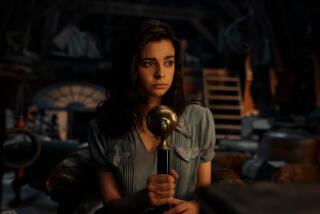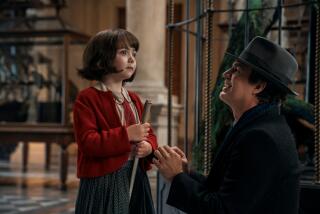A Man’s Struggle in a World Gone Dark
- Share via
Born three months premature into the less advanced medicine of 1955, Stephen Kuusisto developed “retinopathy of prematurity” in the incubator, a scarring of the retinas caused by too much oxygen. In childhood, his best visual correction was 20 / 200 in one eye, the legal definition of blindness. Although he could see light and shapes and, with the aid of telescope glasses, decipher street signs and even read for 20 minutes at a time, the effort sent him into migraine bouts of vomiting and pain.
And yet, up to age 30, he negotiated the world without a cane.
Born into an academic family, Kuusisto studied literature at college and creative writing at the University of Iowa. He won a Fulbright scholarship to his ancestral Finland and entered the doctoral program at the University of North Carolina at Chapel Hill with the dream of becoming a teacher and a poet in the fashion of his blind heroes, Homer and Milton. Even as his eyes became weaker, Kuusisto continued to trudge over the mountains of reading that make up the terrain of graduate study.
And yet, he refused to tell his professors he was blind.
Finally, a freak accident with a razor-sharp paper bookmark (inside a book of poetry, no less) sliced his one good eye into uselessness. The avoided confrontation with self-delusion became inevitable.
“Planet of the Blind” is the story of Kuusisto’s growth from a boy who refused to acknowledge his disability to a man who embraced his blindness so totally that he became director of alumni relations at a guide dog school in upstate New York. With a mother who, in her own heroic measure, refused to send her son to the primitive schools for the blind of the era, and a father who lacked the vocabulary of disability, Kuusisto was born with too much oxygen but too little air. His is the classic American tale of a boy struggling to fit in, to “pass,” in the ‘50s of Eisenhower and the ‘60s of Kennedy, when the only permissible way to stick out was to excel.
Much of this memoir is splendidly written, or spoken. “Planet of the Blind,” an end note tells us, was composed with the aid of speech synthesizing software that presumably allowed Kuusisto to narrate his book onto the page. The result is a lyrical poetry sprinkled among the prose. “There is, at the center of our skulls, a terrible glittering, a requiem light,” Kuusisto says as he describes how he once rode a bicycle. “I lower my face to the cold handlebars and decide it’s a shadow, a hole in the sunlight, and pedal straight through.” When he writes of his appreciation of the paintings of Jackson Pollock or of his waking nightmares, where Evelyn Wood, the sultana of speed reading, appears before him in a turban, promising sugarplums of Proust at 60 pages per minute, Kuusisto shows flashes of true voice and spirit.
Writers from Homer and Milton through Helen Keller and Ved Mehta in this century have made us realize that the recitation of blindness is best done with a light hand. The reputations of these writers have little to do with their disability and much to do with their minds and their experience. Mehta, when he writes of an extraordinary meeting, as a boy of 13, with Indian Prime Minister Jawaharlal Nehru, manages the whole awkward scene in under three pages, and Milton’s famous sonnet “When I consider how my light is spent” is, after all, only the length of a sonnet.
If Kuusisto’s memoir doesn’t quite measure up to its promise, perhaps it is because Kuusisto’s race, like too many in our memoir-glutted days, is only half run.
At the end of the book, his acceptance of blindness is, well, disappointing, and leaves the bland aftertaste of a self-help book rather than the noble hunger of poetry. One hopes that, as valuable as his practical choice of occupation--training guide dogs--may be, that Kuusisto never stops listening to his more classical guides. “They also serve,” as Milton wrote, “who only stand and wait.”
More to Read
Sign up for our Book Club newsletter
Get the latest news, events and more from the Los Angeles Times Book Club, and help us get L.A. reading and talking.
You may occasionally receive promotional content from the Los Angeles Times.










